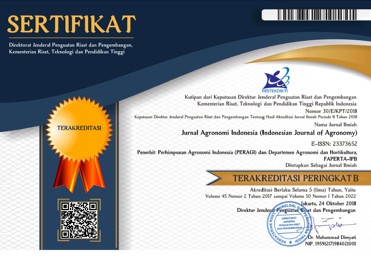Effect of Tree Litter Application on Lowland Rice Yield in Bangladesh
Abstract
The effect of tree litters on rice yield (cv. BR11) was evaluated in the study. Four kinds of tree litter, i.e., ipil-ipil or lamtoro (Leucaena leucocephala (Lamk) De Witt), sissoo (Dalbergia sissoo), akashmoni (Acacia auriculiformis) and mander (Erythrina orientalis) were incorporated into the soil 15 days before transplanting at rate of 5 ton/ha supplemented with inorganic fertilizers (83 kg N, 48 kg P205, 42 kg K20, 10 kg S and 3.6 kg Zn/ha). In the control plots only recommended inorganic fertilizer were applied. Results showed that tree litter application had a significantly positive effect on the yield parameters such as plant height, panicle length, tillers per hill, filled grain and index of 1000-grain weight. Grain yield of plots treated with ipil-ipil, sissoo, akashmoni and mander was 5.61, 4.49, 4.95 and 5.36 ton/ha, and the yield increased over control plots 39.6, 11.7, 23.1 and 33.3%, respectively. It is worthy to note that addition of tree litter to inorganic fertilizer produced significantly higher yield than inorganic fertilizers solely. Among the tree litter, ipil-ipil and mander had the greatest increase in rice yield, while akashmoni was intermediate and sissoo was the least.
Key words: Agroforestry residues, rice, sustainable agriculture and tree-based cropping













